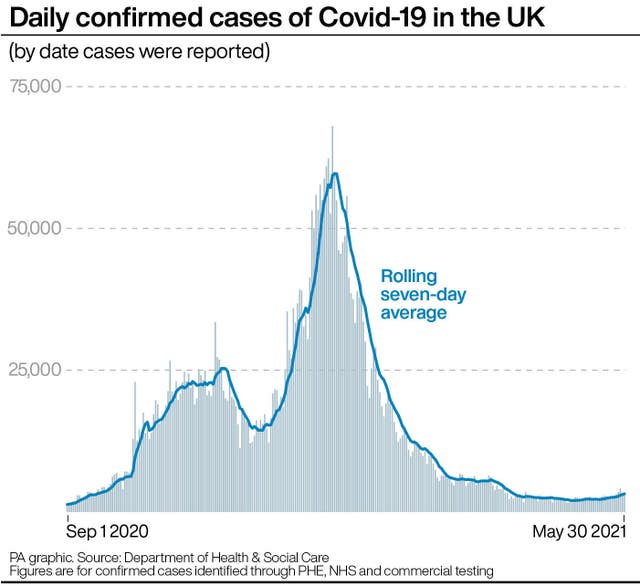Coronavirus (Covid-19) vaccines must be shared with poorer nations to prevent richer countries being hit by newly-imported deadly variants, world leaders have been told.
We’re all in it together
Global bodies – along with MPs and peers – warned of fresh lockdowns if people in developing nations do not get a huge increase in jabs.
The warnings came as calls grew from experts to postpone England’s unlocking on 21 June due to fears the Indian variant is fuelling a third wave of potentially “explosive” coronavirus infections.
In Scotland, first minister Nicola Sturgeon will confirm “whether and to what extent” plans to further ease coronavirus restrictions can take place on 7 June, amid extra controls in Glasgow to deal with rising cases.
With vaccines seen as the main escape route from repeated lockdowns to control the pandemic, governments around the world are being urged to do more to ensure those in developing nations can access jabs. The heads of the World Health Organisation, International Monetary Fund, World Bank Group, and World Trade Organisation warned of a “dangerous gap” in the availability of jabs, with low-income nations receiving “less than 1% of vaccines administered so far”.
They argued in an open letter published in a number of global newspapers
Inequitable vaccine distribution is not only leaving untold millions of people vulnerable to the virus. It is also allowing deadly variants to emerge and ricochet back across the world
Jabs for all
In a separate letter, a cross-party group of more than 100 MPs and peers wrote to the prime minister with a similar message, calling for Britain to export more jabs to developing countries in a bid to prevent new variants from wrecking Britain’s freedom plans.
Urging Boris Johnson to show “global leadership” in the run-up to the G7 in Cornwall next week, the parliamentarians – including former archbishop of Canterbury lord Carey and Tory ex-health minister Dr Dan Poulter – urged him to commit to a one in, one out policy when it comes to vaccines.
For every dose bought for use in Britain, the signatories want the UK Government to donate a dose to the United Nations-backed Covax scheme, which is providing vaccines to low and middle-income countries.
They told Johnson in a letter seen by the PA news agency:
The longer we wait to act, the more likely it is that dangerous variants could emerge that can evade the protections offered by current vaccines
Roll out
The race to vaccinate the UK gathered pace on 31 May after a major walk-in vaccination centre at Twickenham Stadium opened-up the jab offer to anyone aged over 18 in order not to waste doses. Currently, only those aged over 30 are being invited to book for a shot.
The call led to lengthy queues in South-West London as thousands of young people lined-up for a jab, adding to the 39.3 million people in the UK who have been given a first dose and a further 25.5 million who have had both.
Despite the vaccine rate, government advisers have urged ministers to apply the brakes and delay scraping all restrictions in little under three weeks’ time due to an uptick in recent cases.
On 31 May, 3,383 lab-confirmed cases were confirmed in the UK – the sixth day in a row that 3,000 or more cases had been recorded. One further death was reported within 28 days of a positive coronavirus test, according to government data.
Environment secretary George Eustice, asked about the possibility of a delay to freedom from restrictions, told the BBC that ministers “can’t rule anything out”.
Professor Ravi Gupta, a member of the New and Emerging Respiratory Virus Threats Advisory Group (Nervtag), said with the UK in the grip of an “early” third wave of coronavirus infections, the government should consider pushing back the June 21 target “by a few weeks” to allow more people to receive both vaccine doses.
He said:
If you look at the costs and benefits of getting it wrong, I think it is heavily in favour of delay.
But professor Read, a member of the Joint Committee on Vaccination and Immunisation (JCVI) which advises the government on vaccine priority, denied Britain had entered a third wave, suggesting “we’re not quite at that stage”.
Striking a more optimistic tone about the prospect of the PM being able to deliver on his road map, he told BBC Radio 4 it was “quite possible that the Government could move to full reopening” as vaccines were proving “very effective” against the Indian mutation.

Levelling up
Scots will find out on 1 June whether they will progress to Level 1 restrictions on 7 June, as per the Scottish Government’s Covid route map.
A move to Level 1, if it goes ahead, would allow up to eight people from three households to meet indoors in pubs, cafes, and bars, while up to 12 people from 12 different households could socialise together outside in gardens or outdoor public places.
But with a recent spike in infections forcing ministers to keep the entire Glasgow City Council area under Level 3 restrictions – meaning bars and restaurants can not serve alcohol indoors and get-togethers inside people’s homes are also barred – Sturgeon has already warned that the city may “have to be in Level 2 for a couple of weeks before it moves to Level 1”.
Meanwhile, schools could stay open half an hour longer each day as part of a £15bn plan to help pupils catch-up after having their learning disrupted by coronavirus shutdowns, according to the Times.


















